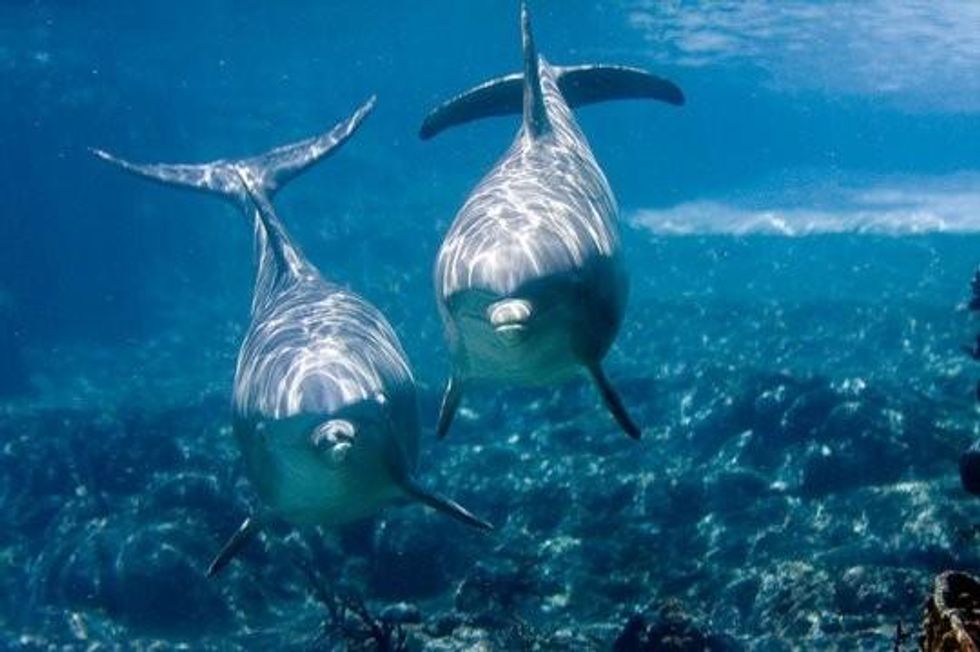'Alarming' Trend of Dolphin Deaths Hitting East Coast Shores
From New Jersey to Florida, the "sentinels of ocean health" are turning up dead

Virginia has had 100 dolphin carcasses on its shores this year. Twenty-five dead or dying bottlenose dolphins have washed up on New Jersey shores since July 9, while Maryland and Delaware have seen several dead dolphins on its shores this summer. And in July, the National Oceanic and Atmospheric Administration Fisheries declared an Unusual Mortality Event for bottlenose dolphins in Florida's Indian River Lagoon, where 50 dead dolphins have been found, a number three times the historical average.
"It is alarming since it's much higher than normal and in such a short amount of time," the Baltimore Sun quotes Jennifer Dittmar, the stranding coordinator for the National Aquarium in Baltimore as saying. "As far as an overall effect it's having on the population, it's hard to tell right now."
Scientists aren't sure what's causing the deaths at this point, though Susan Barco, research coordinator for the Virginia Aquarium & Marine Science Center, said the strandings are "eerily familiar" to mass die-off of dolphins in 1987 when the measles-like morbillivirus brought 750 dolphin carcases to shores between New Jersey and Florida.
One expert says the die-off may be issuing a warning about the health of the ocean.
"This is really frightening because these animals are sentinels of ocean health," the Baltimore Sun quotes Barco as saying. "Strandings have been much more common in the past few decades, and we think it's an indication of the health of our ecosystem."
____________________
An Urgent Message From Our Co-Founder
Dear Common Dreams reader, The U.S. is on a fast track to authoritarianism like nothing I've ever seen. Meanwhile, corporate news outlets are utterly capitulating to Trump, twisting their coverage to avoid drawing his ire while lining up to stuff cash in his pockets. That's why I believe that Common Dreams is doing the best and most consequential reporting that we've ever done. Our small but mighty team is a progressive reporting powerhouse, covering the news every day that the corporate media never will. Our mission has always been simple: To inform. To inspire. And to ignite change for the common good. Now here's the key piece that I want all our readers to understand: None of this would be possible without your financial support. That's not just some fundraising cliche. It's the absolute and literal truth. We don't accept corporate advertising and never will. We don't have a paywall because we don't think people should be blocked from critical news based on their ability to pay. Everything we do is funded by the donations of readers like you. Will you donate now to help power the nonprofit, independent reporting of Common Dreams? Thank you for being a vital member of our community. Together, we can keep independent journalism alive when it’s needed most. - Craig Brown, Co-founder |

Virginia has had 100 dolphin carcasses on its shores this year. Twenty-five dead or dying bottlenose dolphins have washed up on New Jersey shores since July 9, while Maryland and Delaware have seen several dead dolphins on its shores this summer. And in July, the National Oceanic and Atmospheric Administration Fisheries declared an Unusual Mortality Event for bottlenose dolphins in Florida's Indian River Lagoon, where 50 dead dolphins have been found, a number three times the historical average.
"It is alarming since it's much higher than normal and in such a short amount of time," the Baltimore Sun quotes Jennifer Dittmar, the stranding coordinator for the National Aquarium in Baltimore as saying. "As far as an overall effect it's having on the population, it's hard to tell right now."
Scientists aren't sure what's causing the deaths at this point, though Susan Barco, research coordinator for the Virginia Aquarium & Marine Science Center, said the strandings are "eerily familiar" to mass die-off of dolphins in 1987 when the measles-like morbillivirus brought 750 dolphin carcases to shores between New Jersey and Florida.
One expert says the die-off may be issuing a warning about the health of the ocean.
"This is really frightening because these animals are sentinels of ocean health," the Baltimore Sun quotes Barco as saying. "Strandings have been much more common in the past few decades, and we think it's an indication of the health of our ecosystem."
____________________

Virginia has had 100 dolphin carcasses on its shores this year. Twenty-five dead or dying bottlenose dolphins have washed up on New Jersey shores since July 9, while Maryland and Delaware have seen several dead dolphins on its shores this summer. And in July, the National Oceanic and Atmospheric Administration Fisheries declared an Unusual Mortality Event for bottlenose dolphins in Florida's Indian River Lagoon, where 50 dead dolphins have been found, a number three times the historical average.
"It is alarming since it's much higher than normal and in such a short amount of time," the Baltimore Sun quotes Jennifer Dittmar, the stranding coordinator for the National Aquarium in Baltimore as saying. "As far as an overall effect it's having on the population, it's hard to tell right now."
Scientists aren't sure what's causing the deaths at this point, though Susan Barco, research coordinator for the Virginia Aquarium & Marine Science Center, said the strandings are "eerily familiar" to mass die-off of dolphins in 1987 when the measles-like morbillivirus brought 750 dolphin carcases to shores between New Jersey and Florida.
One expert says the die-off may be issuing a warning about the health of the ocean.
"This is really frightening because these animals are sentinels of ocean health," the Baltimore Sun quotes Barco as saying. "Strandings have been much more common in the past few decades, and we think it's an indication of the health of our ecosystem."
____________________

